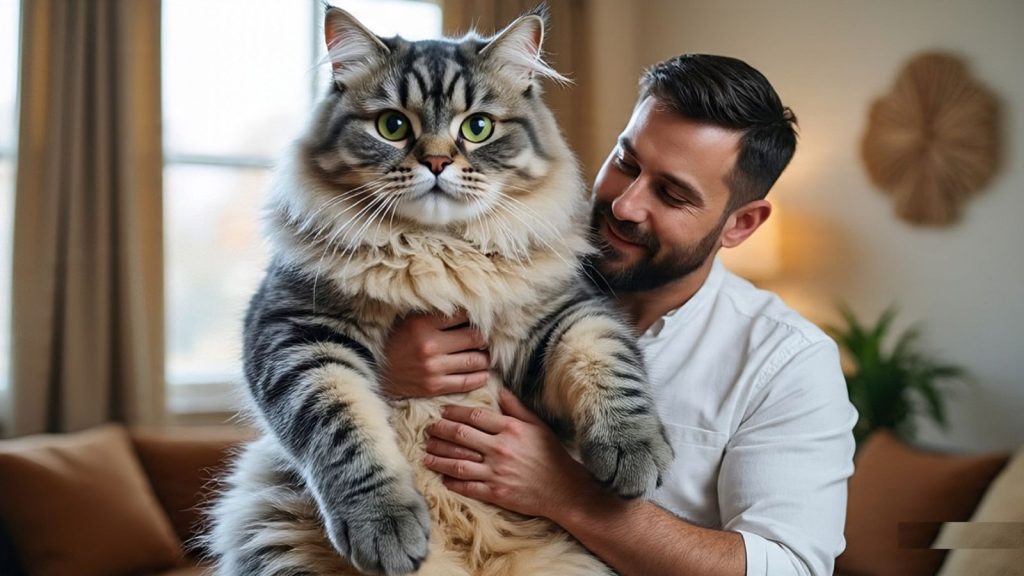What is a Maine Coon Cat?
The Maine Coon is one of the most beloved and distinctive cat breeds in the world, known for their impressive size, luxurious coat, and gentle temperament. Often called “gentle giants,” these magnificent felines originated in the state of Maine and have captured hearts worldwide with their dog-like personalities and striking appearance.
Maine Coons are the largest domesticated cat breed, with males typically weighing between 13-18 pounds and females ranging from 8-12 pounds. Their most distinctive features include tufted ears, bushy tails, and a thick, water-resistant coat that helped them survive harsh New England winters.
Maine Coon History and Origin: From Working Cats to Beloved Companions
The Legend and Reality
While many colorful legends surround the Maine Coon’s origin, including tales of cats mating with raccoons (biologically impossible), the most likely explanation is that they descended from long-haired cats brought to America by European sailors in the 1700s.
Development as a Breed
- 1800s: Maine Coons gained popularity as working cats on farms and ships
- 1895: The first Maine Coon cat show winner was a female named Cosey
- 1950s-1960s: Breed nearly went extinct due to Persian cat popularity
- 1970s: Breed revival began with dedicated breeders
- 1976: Maine Coon Cat Club founded
- 1985: Became Maine’s official state cat
Maine Coon Physical Characteristics: What Makes Them Unique
Size and Build
Maine Coons are built for survival in harsh climates. Their large, muscular bodies feature:
- Weight: Males 13-18 lbs, Females 8-12 lbs
- Length: Can reach up to 40 inches including tail
- Height: 10-16 inches at shoulder
- Maturity: Don’t reach full size until 3-5 years old
Distinctive Features
Coat: Double-layered, water-resistant fur that’s longer on the stomach and back legs Tail: Bushy and long, often as long as their body Ears: Large, wide-set, with distinctive lynx-like tufts Eyes: Large, expressive, in colors ranging from green to gold to copper Paws: Large, tufted “snowshoe” paws for walking on snow
Maine Coon Colors and Patterns: A Rainbow of Possibilities
Accepted Colors
Maine Coons come in over 75 different color and pattern combinations:
Solid Colors:
- Black Maine Coon
- White Maine Coon
- Red Maine Coon
- Blue Maine Coon
- Cream Maine Coon
Tabby Patterns:
- Brown tabby Maine Coon (most common)
- Silver tabby Maine Coon
- Red tabby Maine Coon
- Blue tabby Maine Coon
Other Popular Patterns:
- Tortoiseshell Maine Coon
- Calico Maine Coon
- Smoke Maine Coon
- Shaded Maine Coon
Note: Chocolate, lavender, and pointed patterns are not accepted in breed standards.
Maine Coon Personality and Temperament: The Gentle Giant’s Character
Personality Traits
Maine Coons are renowned for their exceptional personalities:
Gentle and Friendly: Despite their size, they’re known as “gentle giants” with calm, patient dispositions
Intelligent: Highly trainable and problem-solving abilities
Social: Enjoy human company and often follow their owners around
Playful: Maintain kitten-like playfulness well into adulthood
Vocal: Known for chirping, trilling, and “talking” to their owners
Water-Loving: Unlike most cats, many Maine Coons enjoy water
Maine Coon with Children and Pets
Maine Coons are excellent family cats, known for:
- Patience with children
- Gentle play style
- Good compatibility with other pets
- Protective instincts toward family members
Maine Coon Care and Grooming: Keeping Your Gentle Giant Healthy
Grooming Requirements
Daily Brushing: Essential to prevent matting and reduce shedding Weekly Baths: Optional but helpful for coat health Nail Trimming: Every 2-3 weeks Ear Cleaning: Weekly to prevent infections Dental Care: Regular brushing and dental treats
Exercise Needs
Maine Coons need moderate exercise to maintain health:
- Interactive play sessions
- Climbing trees or cat towers
- Puzzle toys for mental stimulation
- Outdoor supervised time (if safe)
Maine Coon Health Issues: What Every Owner Should Know
Common Health Concerns
Hypertrophic Cardiomyopathy (HCM): Heart condition affecting Maine Coons Hip Dysplasia: Joint condition more common in larger cats Spinal Muscular Atrophy (SMA): Genetic condition affecting muscle development Polycystic Kidney Disease (PKD): Kidney condition requiring monitoring
Preventive Care
- Regular veterinary checkups
- Genetic testing for breeding cats
- Heart screenings
- Maintaining healthy weight
- Quality diet and exercise
Life Expectancy
Maine Coons typically live 12-15 years with proper care, though some live into their late teens.
Maine Coon Kittens: What to Expect
Finding a Reputable Breeder
Research: Look for breeders who health test their cats Visit: Meet the parents and see living conditions Health Guarantees: Ensure proper health certifications Registration: Verify cats are registered with recognized organizations
Maine Coon Kitten Development
- 8-12 weeks: Ready for new homes
- 3-6 months: Rapid growth phase
- 6-12 months: Continued growth and personality development
- 1-5 years: Reaching full size and maturity
Maine Coon Kitten Prices
- Pet quality: $400-$2,000
- Show quality: $1,000-$3,000+
- Breeding rights: $2,000-$5,000+
Prices vary by location, breeder reputation, and bloodlines.
Maine Coon vs Other Cat Breeds: How They Compare
Maine Coon vs Norwegian Forest Cat
- Size: Maine Coons are generally larger
- Coat: Both have long, thick coats but different textures
- Personality: Maine Coons are more social and vocal
Maine Coon vs Ragdoll
- Build: Maine Coons are more muscular and athletic
- Personality: Both are gentle, but Maine Coons are more active
- Grooming: Similar grooming needs
Maine Coon vs Persian
- Face: Maine Coons have longer faces, Persians are flat-faced
- Activity: Maine Coons are more active and playful
- Grooming: Persians require more intensive grooming
Feeding Your Maine Coon: Nutrition for Large Cats
Dietary Requirements
High-Quality Protein: Essential for muscle maintenance Controlled Portions: Prevent obesity in less active cats Age-Appropriate Food: Kitten, adult, and senior formulas Fresh Water: Always available, especially important for kidney health
Feeding Schedule
- Kittens: 3-4 meals per day
- Adults: 2 meals per day
- Seniors: May need adjusted portions or special diets
Maine Coon Adoption and Rescue: Giving a Second Chance
Finding Maine Coon Rescues
Many Maine Coons need homes through:
- Breed-specific rescue organizations
- General cat shelters
- Online adoption platforms
- Maine Coon breed clubs
Benefits of Adoption
- Save a life
- Lower cost than buying from breeders
- Often already spayed/neutered
- Adult cats have established personalities
Living with a Maine Coon: Creating the Perfect Environment
Space Requirements
Maine Coons need adequate space for their size:
- Tall cat trees for climbing
- Multiple scratching posts
- Large litter boxes
- Spacious sleeping areas
Indoor vs Outdoor
Indoor Life: Safer but requires enrichment Supervised Outdoor: Harness training or enclosed patios Safety Considerations: Traffic, predators, and disease risks
Maine Coon Fun Facts: Amazing Things About These Gentle Giants
- Size Records: The longest domestic cat on record was a Maine Coon named Stewie at 48.5 inches
- Water Cats: Many Maine Coons love water and will join their owners in the shower
- Dog-Like: They often fetch, come when called, and walk on leashes
- Vocal Variety: They rarely meow, preferring chirps, trills, and chattering
- Winter Warriors: Their coat grows thicker in winter and sheds in summer
- Social Sleepers: They often sleep with their owners or other pets
- Late Bloomers: They don’t reach full size until 3-5 years old
Conclusion: Why Maine Coons Make Perfect Companions
Maine Coons represent the perfect combination of beauty, personality, and companionship. Their gentle nature, impressive size, and striking appearance make them one of the most sought-after cat breeds in the world. Whether you’re looking for a playful family pet, a loyal companion, or a stunning show cat, the Maine Coon delivers on all fronts.
Their adaptability to various living situations, combined with their loving personalities, makes them suitable for first-time cat owners and experienced cat enthusiasts alike. While they do require regular grooming and adequate space, the joy and companionship they provide far outweigh any maintenance requirements.
If you’re considering adding a Maine Coon to your family, take time to research reputable breeders or rescue organizations. These magnificent cats deserve homes that can provide them with the love, care, and attention they need to thrive.

Theo Louse
I am Theo Louse. My skills are dedicated to the field of technology information and try to make daily lives more enjoyable. With more than 12 years of experience with BM, we are particularly famous for 100% self-developed ideas. Over these years, we have worked to make everyday life more convenient for the fast-paced world we live in.

